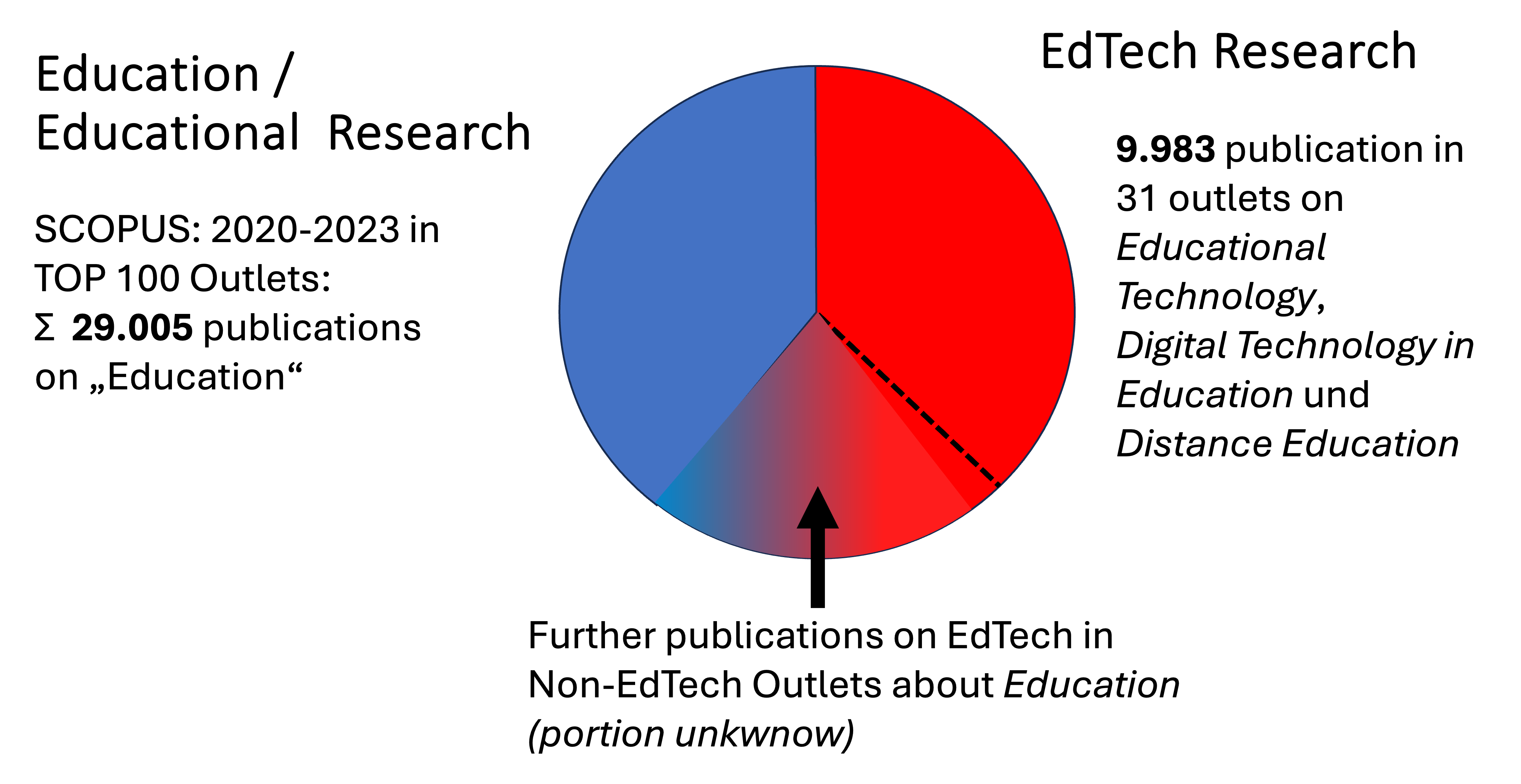To identify the "state of research" for your theses or paper, you will need to scan the relevant literature to identify the latest insights from authors around the world. Textbooks will not provide enough detail about recent findings. In EdTech, journals (and some proceedings of conferences) are the major sources for up-to-date research. Students often ask: "What are the relevant journals? Where to look for current research findings in the field of EdTech?" The following list might help you.
Furthermore, in a recent research paper, Kerres (2025) has analyzed differences between the international and research in German with regard to a) the amount and portion of EdTech in educational research and b) the differences in the theoretical and conceptual arguments presented in both spheres. This might be helpful to understand the peculiar role EdTech research has (not) found in the German speaking world.
Some of the results (along with the dataset) is outlined in a further paragraph on this page: EdTech vs. Non-EdTech in German and English research.
Scholarly journals in the field of Educational Technology
Our selection of 40 journals is based on three criteria ("metrics"):
1) Journal Citation Report (JCR): List of journals in "Education"
2) SciMago Journal Rank (SJR): List of journals in "Education", 1. + 2. quartile
3) Google Scholar: List of journals in "Educational Technology"
These metrics are typically based on the number of citations the articles of a journal have received over a period of time from other sources. They differ in the way they calculate their rankings, e.g. some omit Editorials or punish for self-citations and use different baselines. Our selection does not imply that other outlets do not convey important results based on rigourous methods for research. However, the chance to be read and to be referenced simply seems more probable in these selected journals. Therefore, they attract more authors to submit their research papers and are often in a position to be highly selective when choosing the best papers for publication. Like all high-quality journals, their decision to publish a submitted paper relies on a double-blind review process where the reviewers do not know the name of the authors and the authors do not know who are the reviewers.
What does this mean? Journals in our list comprise of articles that are often referred to and therefore, these journals seem to be a good starting point for your investigation. However, the reverse conclusion would be missleading: Not all articles in these journals are automatically more relevant or have a higher quality or importance. For each article, you will need to analyze the relevance and quality thoroughly and you might find important contributions in other journals as well.
Status: 1st Sept. 2021. Subject related journals (e.g. for language learning) have been excluded. The appended document provides more information about members of editorial boards from Germany.
German Journals : There are no scholarly journals entirely devoted to EdTech. The following journals, however, also do publish papers related to EdTech:
- MedienPädagogik. Zeitschrift für Theorie und Praxis der Medienbildung (von Deutsche Gesellschaft für Erziehungswissenschaft e.V., Sektion Medienpädagogik mit PH Zürich)
- merz. Zeitschrift für Medienpädagogik (vom JFF – Jugend Film Fernsehen e. V., München)
- Medienimpulse. Beiträge zur Medienpädagogik (von BMBWF, Wien mit U und PH Wien)
EdTech vs. Non-EdTech Research Output: A Comparative Analysis of English and German Literature (2020–2023)
A recent analysis of publications in the 100 most-cited education journals from 2020 to 2023 revealed a pronounced focus on educational technology (EdTech) within international scholarship. Kerres (2025) found that approximately two-thirds of the 29,000 articles published in journals categorized under “Education” appeared in EdTech-specific outlets. Furthermore, a significant yet unquantified proportion of articles in non-EdTech journals also addressed digital technologies in learning contexts. These findings suggest that EdTech dominates global educational research agendas, reflecting its centrality to contemporary scholarly discourse (see Appendix).

In contrast, an examination of PEDOCS - a German-language educational research database comprising roughly 45,000 entries - identified only 2,289 items categorized under Medienpädagogik. This category encompasses research on digital learning - in German with the label Mediendidaktik - as well as the broader sociocultural aspects of media in education, indicating a narrower thematic scope compared to the international EdTech focus. While methodological differences preclude direct comparisons between the datasets, the disparity underscores a notable divergence: EdTech occupies a disproportionately large share of global educational research, whereas Mediendidaktik and EdTech Research remains a niche subfield in German-speaking academia (see Appendix).
References
Kerres, M. (2025). Mediendidaktik – Versuch einer Positionierung. Medienpädagogik. https://doi.org/10.21240/mpaed/65/2025.04.26.X
___
Further entry points to find and elaborate your research question: more